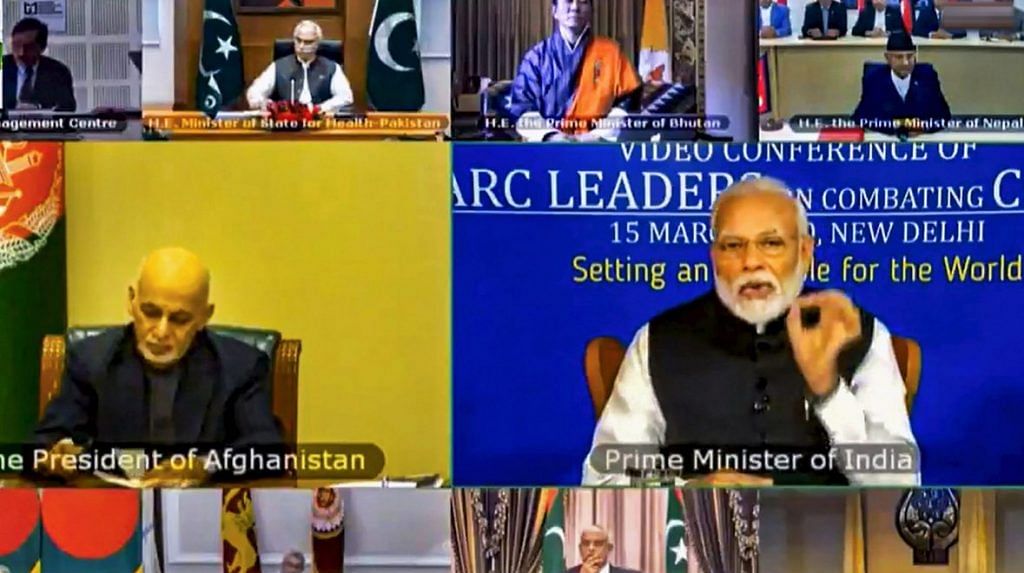New Delhi: India Sunday pledged a contribution of $10 million towards a ‘SAARC Covid-19 Emergency Fund’ proposed by Prime Minister Narendra Modi during a video conference with other members of the regional grouping — Pakistan, Afghanistan, Bhutan, the Maldives, Nepal, Bangladesh and Sri Lanka.
Among the highlights of the chat, telecast live, was Pakistan’s decision to raise Kashmir as it called for India to lift restrictions in the Valley to ensure proper healthcare to its residents.
The video conference was held on PM Modi’s initiative as he sought to rally the region’s countries together to fight the coronavirus pandemic sweeping through the world. The pandemic has claimed nearly 5,500 lives since it was first reported in China last December.
“I propose we create a COVID-19 Emergency Fund. This could be based on voluntary contributions from all of us. India can start with an initial offer of 10 million US dollars for this fund,” Modi said at the conference.
“Any of us can use the fund to meet the cost of immediate actions. Our foreign secretaries, through our embassies can coordinate quickly to finalise the concept of this fund and its operations,” he added.
According to sources, the fund pledged by India is an initial contribution that can be expanded going forward. However, the modalities — how the fund will be created and whether an escrow account will be created for — are yet to be worked out.
The sources added that other countries had also been asked to contribute “based on their comfort level”.
Also read: Modi makes surprise call to SAARC nations to ‘fight coronavirus’ — after 4 yrs of stalemate
What India has offered
On its part, India also offered a rapid response team and online training to tackle the deadly virus.
“We are assembling a Rapid Response Team of doctors and specialists in India, along with testing kits and other equipment. They will be on stand-by, to be placed at your disposal, if required,” Modi told the SAARC leaders.
He said India will also be able to “quickly arrange online training capsules for your emergency response teams. This will be based on the model we have used in our own country, to raise the capacity of all our emergency staff”.
A common research platform has also been proposed under the SAARC framework, which will focus not only on coronavirus but challenges posed by this kind of emergency in the future, Modi said.
“Finally, this is not the first nor the last such pandemic that will affect us. We should evolve common SAARC Pandemic Protocols which can be applied on all our borders as well as within our borders in such situations,” Modi said. “This can help to prevent such infections from spreading across our region, and allow us to keep our internal movements free.”
Imran Khan misses conference
The conference brought SAARC leaders together after four years, with tensions between India and Pakistan following the 2016 Uri attack rendering the grouping dormant since.
The videoconference was attended by all SAARC leaders, except Pakistan Prime Minister Imran Khan, who was represented by his special assistant on national health services, Zafar Mirza.
When his turn came, Mirza said all restrictions from the Valley should be removed in view of the health emergency.
“In view of the health emergency it is imperative that all the restrictions in the disputed territory (Kashmir) must be lifted immediately, opening up communication and movement would facilitate dissemination of information, allow distribution of medical supplies and enable containment and relief efforts to proceed unimpeded,” Mirza added.
He said SAARC was the “least integrated” region, which is why crucial health services remain fragmented.
“SAARC secretariat does provide that platform which brings us together. We believe we need to use this platform as a platform for pulling of resources of all kind, including technical expertise, national experiences and even financing that can be used by all members,” he added.
Official sources pointed to Imran Khan’s absence at the video conference to suggest Pakistan was again trying to “politicise” an important and humanitarian issue.
India, the sources said, could have avoided inviting Pakistan into the video conference because of their tensions too, but didn’t in light of the humanitarian aspect of the current crisis.
SAARC taskforce proposed
Afghanistan President Ashraf Ghani proposed the creation of a SAARC taskforce to address the challenge of coronavirus.
He also proposed a five-point plan to combat the spread of the virus within the South Asian region that he said had been rolled out in his country.
Bangladesh Prime Minister Sheikh Hasina said a “strong SAARC-wide strategy” was needed to combat the challenge, pointing out that the country had a national strategy in pace.
Sri Lankan President Gotabaya Rajapaksa urged that the SAARC inter-ministerial dialogue on emergency situations be revived, while Bhutan’s PM Lotay Tshering, a doctor, suggested having an open conversation with other world leaders too.
Maldives President Ibu Solih pointed to the pandemic’s toll on its tourism industry, a mainstay of its economy, and sought help from India in terms of healthcare professionals, medical gear and economic aid to help the country fight the challenge.
PM Modi has also proposed a similar videoconference with all G20 leaders. However, sources said, the decision on that will be taken by Saudi Arabia, which is the chair this year.
‘Evacuation process to continue’
Speaking to ThePrint about India’s evacuation plans for nationals abroad, sources said New Delhi will continue to bring back people, especially from Italy and Iran where the situation was described as “overwhelming”.
So far, India has evacuated 1,444 Indian nationals, including 766 from China, 124 from Japan, 336 from Iran and 218 from Italy.
Sources said, in countries like Italy and Iran, Indian embassies were doubling up as guest houses, with people also being fed on the premises.
Also read: How coronavirus spread in India — 39 of the first 50 patients came from Italy, Iran, China
